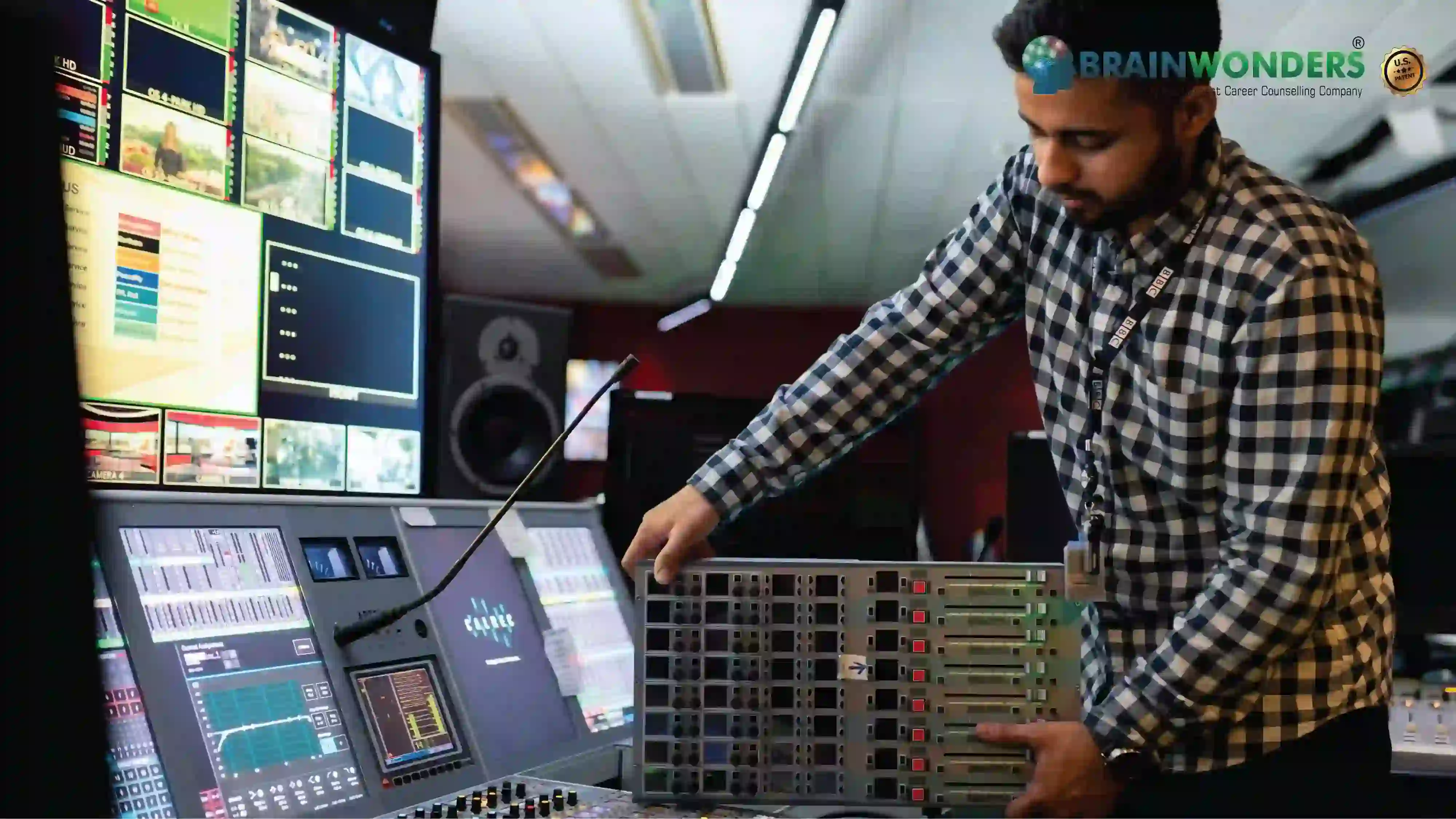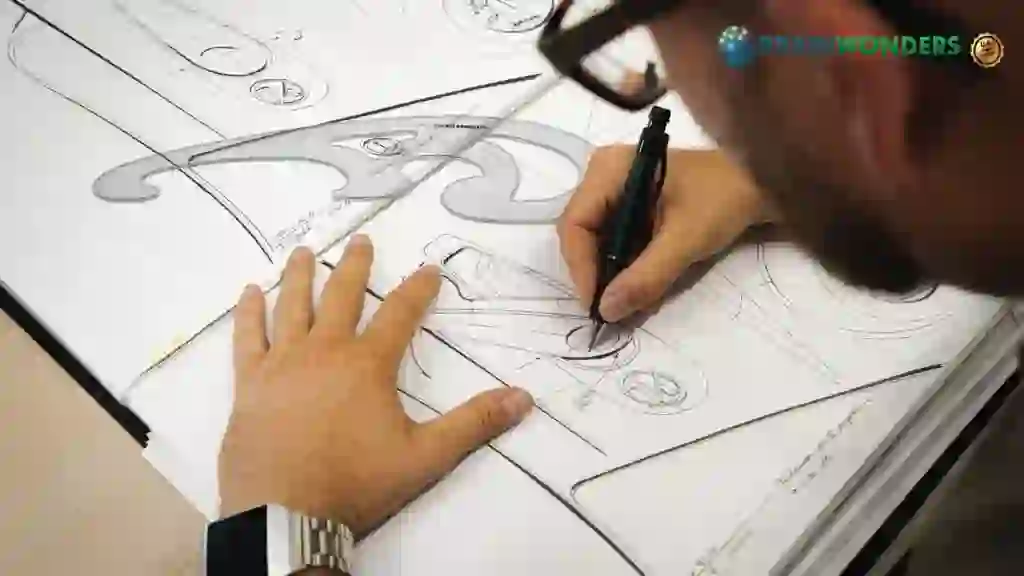How to become a Broadcast Engineer
Overview, Courses, Exam, Colleges, Pathways, Salary

Overview
Who is Broadcast Engineer ?
A broadcast engineer is a professional who heads a team of technicians to ensure the quality as well as the production of broadcasts working from behind the scenes of television, radio and new media show or event. Broadcast engineering is primarily associated with setting up, supervising, maintaining, repairing and even replacing all the audio, video, sound and technical equipment in radio, studio and television broadcasts. Broadcasting can be related to other branches of engineering such as electrical, electronics, communication, radio-physics, and to a certain extent even computer engineering and IT.
These engineers may be required to work long hours, work until the job is done so extra hours are inevitable. The work environment for a broadcast engineer typically ranges from a comfortable office to extreme conditions in foreign locations depending on the job at hand. This line of work is often claimed to be high-pressured. A broadcast engineer may work with production, post-production facilities and studios, broadcast engineering consultants and so on. The role of a broadcast engineer provides job satisfaction and great growth opportunities for truly keen aspirants. It is also recommended to opt for specialization after a little bit of experience to further the chances of growth and better opportunities. Broadcast engineers can specialize in print journalism, TV broadcasts, online media and so on.
Typical day at work
What does Broadcast Engineer do?
The particular role of a broadcast engineer is multifaceted but typically depends on the area of specialization. Generally, it comprises of the following tasks:
- Conduct checks and rechecks of the equipment to ensure it is functional
- Repair, and if need be, replace old and outdated equipment
- Ensure that the programs are broadcasted on time and maintain the highest level of quality
- Set up the operating equipment and transmission links during outside broadcasts
- Interpret and implement the instructions from producers, directors and other colleagues
- Maintain specialist equipment for the broadcast and satellite transmission and interactive media
- Design, install and test new equipment
- Recommend enhancements
Abilities and Aptitude needed
What are the skills, abilities & aptitude needed to become Broadcast Engineer?
We calculated that 9% of Broadcast Engineers are skilled in Technical Support, Troubleshooting, and RF. They are also known for soft skills such as communication, computer, and problem-solving abilities. Technical support Assist broadcast facilities with the repair, maintenance, installation, and modification of technical broadcasting equipment. Troubleshoot Managed Equipment for LIVE Sports Broadcast Mixed Live Audio for Time Warner Cable SN Productions Troubleshoot on the fly RF Maintained Wireless Microphones, RF over Fiber Antenna Infrastructure, and Frequency Coordination for Live Show and Corporate Usage Audio equipment Aided in the installation and operation of camera, lighting, and audio equipment.
IP Network infrastructure and AV over IP are areas of expertise. Live broadcasts. Live broadcasts and sporting events that have been engineered Assist in the production of multi-camera remote television productions (live TV). Communication skills are the most important for a Broadcast Engineer in this position. Technicians must communicate with supervisors and coworkers to ensure that clients' needs are met and that equipment is properly set up before broadcasts, live performances, and presentations. Broadcast Engineers can use communication skills to "Specialized tasks such as working on equipment requiring Federal Communications Commission (FCC) licencing.
Another frequently encountered skill for being able to perform Broadcast Engineer duties is: Computer abilities. Technicians use computer systems to programme equipment and edit audio and video recordings. Maintain routers, computers, switchers, encoders, servers, tape machines, satellite receivers, transmitters, and so on. Broadcast Engineers must also be capable of problem solving. Technicians must recognise equipment problems and propose potential solutions. Resolve functionality issues professional video equipment and perform routine maintenance to ensure consistent, reliable transmission quality.
Pathways
How to become an Broadcast Engineer?
Entrance Exam
Entrance Exam for Broadcast Engineer ?
In order to enrol into a Bachelor’s program at an esteemed university, aspirants are expected to clear the JEE main and subsequently, the JEE Advance exam which makes the aspirant eligible to apply at any university in India. It is a challenging exam to crack that requires hard work as well as rigorous and consistent preparation. Some states have their own entrance exams that are admissible in their respective universities. Many educational institutes conduct their own entrance tests and do not require clearing any entrance tests.
Courses
Which course I can pursue?
Best Colleges
Which are the best colleges to attend to become an Broadcast Engineer?
Industries
Which Industries are open for Broadcast Engineer?
Depending on the area of interest, the level of expertise and experience, aspirants may apply for the following broadcast engineering jobs:
- Remote Broadcast Engineer
- Outside Broadcast Engineer
- TV Broadcast Engineer
- Broadcast Design Engineer
- Broadcast Systems Engineer
- Broadcast IT Engineer
- Broadcast Network Engineer
- Digital Media Curator
- Broadcast Maintenance Engineer
- Video Broadcast Engineer
- Sound Recording Technician
- Broadcast Engineering consultant
internship
Are there internships available for Broadcast Engineer?
In any given field, along with theoretical knowledge, it is always an added advantage to get an on-ground experience that enhances the aspirant’s understanding of the domain. It is highly encouraged to take up an internship and gain exposure to the latest tools, methodologies and technology and become fluent with industrial standards. Experience in this field is extremely important and even acts as a platform to form connections and networks which proves to be extremely helpful to establish oneself in this industry. Aspirants may seek internships while studying and even after graduation.
Career outlook
What does the future look like for Broadcast Engineer?
Overall employment of broadcast, sound, and video technicians is expected to grow by 21% between 2020 and 2030, much faster than the national average. On average, 18,000 job openings for broadcast, sound, and video technicians are expected each year over the next decade. Many of those openings are expected to be created as a result of the need to replace workers who transfer to different occupations or leave the labour force for other reasons, such as retirement. The recovery from the COVID-19 recession, which began in 2020 and is expected to occur early in the decade, will account for a large portion of the projected employment growth for these occupations.
The rate of growth will differ depending on the occupation. More businesses are increasing their audio and video budgets so that they can use video conferencing to reduce travel costs and communicate with other offices and clients around the world. Furthermore, an increase in the use of digital signs in a variety of industries, such as hospitals, hotels, and retail stores, should result in increased demand for audio and video technicians. More audio and video technicians may be needed in schools and universities to install and maintain interactive whiteboards and wireless projectors so teachers can give multimedia presentations and record lectures. Broadcast technicians will be needed to set up, operate, and maintain the electronic equipment used to broadcast radio and television programmes.
Lighting technicians will be required to work with lighting and related equipment used in photography, film, and other productions in the future. However, because lighting technicians and other media and communication equipment workers are a small occupation, rapid growth is expected to result in only about 3,800 new jobs over the next decade. Sound engineering technicians will continue to be needed in the recording and motion picture industries to improve the sound quality of shows and movies. However, because sound engineering technicians are a small occupation, the rapid growth will result in only about 2,300 new jobs over the next decade.







